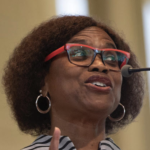
Who is free speech protecting these days? And who is still being attacked?
Free speech is one of the cornerstones of American democracy. But what are the boundaries of free speech?
In the current political milieu, the protection of free speech appears to have an amorphous and wide expanse when it comes to sexist, racist, homophobic, Islamophobic, and xenophobic rants on many social media platforms and college campuses. A recent Knight Foundation survey polled high schoolers about their views on the First Amendment and found that “boys and white students are less inclined than girls and students of color to agree with the statement: The First Amendment goes too far in the rights it guarantees.”
Last month, Cambridge Community Television (CCTV) held a panel discussion tackling the topic of “civil discussion in an uncivilized world,” asking, “Are there limits to the First Amendment?” Susan Fleischmann, executive director of CCTV, who was once a First Amendment absolutist, wanted a discussion on the topic because, under the present administration, hate speech appears to protect the offenders. Ceasar L. McDowell, professor of the practice of civic design at MIT, and Jim Braude of the WGBH shows Greater Boston and Boston Public Radio were the panelists.
“For over 30 years, CCTV has proudly served as a First Amendment forum from our community, and I have defended speech that has been personally very challenging,” Fleischmann said. “However, the needle has dramatically moved.”
McDowell and Braude agreed that there has been a steady decline in public civil discourse. People who traffic in hate speech appear to have boundless ways of disseminating their vitriol, and when challenged, they push back at their opponents, often citing the First Amendment’s protection of free speech.
McDowell told the audience he struggles with identifying “the limits of what we can say to each other, particularly with technology.” Many, like McDowell, feel that social media platforms like Facebook and Twitter are not doing enough to counter hate and violent speech. McDowell acknowledges that people have the right to express their views and need venues to do so, but he wants to know what it means to give voice in public spaces. In other words, is one’s right to free speech limited by where you are, what you say, and how you say it?
As one example, McDowell shared a recent incident he experienced on a crowded train from Harvard Square to Kendall Square. Two white guys on the Red Line were deliberately talking loudly, spewing sexist and xenophobic epithets. McDowell wondered if the guys had a right to speak like that on a train “where people didn’t choose to be in that space for that sort of speech.” The incident highlighted for McDowell the need for civil conversations in public spaces.
In his turn, Braude advised that before you query how people use their speech in the public sphere, you have to ask, How does everyone get the right to speak? In other words, how does society democratize voices in the public sphere to create a level playing field, where no voice is drowned out by louder ones due to social capital, political influence, money, or bullying?
Social media, on the one hand, has democratized voices, especially voices that are marginalized in society due to race, gender, sexual orientation, religion, and political affiliations, to name a few. On the other hand, these sites have created a new kind of neotribalism where people connect only with those who have similar views. Adverse outcomes have included the dissemination of hateful language and deliberate misinformation.
Both panelists are against people using social media anonymously. It’s a controversial and censored stance, since many people contest that anonymity can enable and facilitate free speech, whereas proponents argue that using one’s real identity can foster a greater responsibility, while anonymous platforms that spew hatred can dehumanize victims as well as offenders.
As for how the lack of civic discourse contributes in part to the breakdown of our body politic, McDowell suggested an antidote to the microaggressions we see on social media—micro-inclusions, where institutions and community spaces, like CCTV, have people come together and talk about their rights and duties of citizenship.
“I think this conversation illustrated the dangers of backing down from a principled support of free speech, as well as the need for us to all take responsibility, not only for ourselves as speakers, but as witnesses who cannot sit idly by,” Fleischmann said toward the end of the discussion.
I agree. As someone who intersects multiple identities and is the target of various forms of anonymous hate speech, it’s exhausting to bear the weight of a bigot’s tongue.
Rev. Irene Monroe can be heard on the podcast and standing Boston Public Radio segment ALL REV’D UP on WGBH (89.7 FM). Monroe’s syndicated religion columns appear and the Boston voice for Detour’s African American Heritage Trail. She is a s a Visiting Researcher in the Religion and Conflict Transformation Program at Boston University School of Theology.

